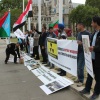Indian State Should Focus on Unconventional Methods: Jamal Nasir Baloch
The Baloch mark 28 May as black day against N-tests

London | 30th May 2015
Baloch activists from Scotland, Germany, Sweden, Norway, South Korea and Canada protest against Pakistan’s nuclear tests in Chaghai in Balochistan province.
On Thursday, 28 May, in Parliament Square a gathering of Baloch men, women and children stood under the Balochistan “flag” in solidarity with their communities across Europe. In a co-ordinated campaign to stop Pakistan’s nuclear testing in Chaghai, the London Baloch activists stood simultaneously with their communities in Scotland, Germany, Sweden, Norway, South Korea and Canada to mourn and to highlight the effects of the 1998 nuclear tests conducted by Pakistan in the Raaskoh mountains. These tests have left an indelible scar on the local environment and population. People and animals have suffered horrible symptoms and deaths. The radiation is still present, therefore, the situation is ongoing and deteriorating. It seems no independent assessment either by scientists or international humanitarian organisations has been permitted.
The activists explained that the Baloch feel bitter about their land being used as a hub for the development and export of nuclear weapons. They feel the proliferation of possibly insecure nuclear weapons being supplied to Iran, North Korea and Saudi Arabia with the apparent tacit acceptance of the West will end up in the hands of religious extremists such as the IS.
Following India’s independence, Balochistan enjoyed nine months of independence before March 1948, when Pakistan annexed it. The Baloch are disappointed that Britain has not honoured Article 3 in the Amended Agreement of 6 December 1876 between Kalat and British India, that “engages to respect the independence of Kalat and to aid the Khan, in case of need, in the maintenance of a just authority and the protection of his territories from external attack…”
Balochistan has been in a state of intermittent conflict ever since, the current conflict between Pakistan and Balochistan has been evolving since 2002, with many injustices including murder reported. Pakistan’s security forces, which have been the real source of political and economic power in the province since 1947, are accused by human rights groups of committing serious and systematic human rights violations. Brad Adams from Human Rights Watch, who was monitoring the situation in 2011, conveyed, “Pakistani security services are brazenly disappearing, torturing, and often killing people, because of suspected ties to the Baloch nationalist movement… The national government has done little to end the carnage in Balochistan, calling into question its willingness or ability to control the military and intelligence agencies.”
Hyrbyair Marri, a Baloch political leader exiled in London is calling for a halt to all nuclear activities, the removal of all nuclear weapons, facilities and waste in Balochistan. “We urge the international community and International Atomic Energy Agency to form an independent committee to investigate the level of destruction caused by Pakistan’s atomic bomb in Balochistan and hold Pakistan accountable at the International Criminal Court for committing war crimes in Balochistan,” he said.
The Baloch activists in London have also visited the Foreign Office to question the aid that Pakistan receives from UK as it appears to them to be directed at Punjabi projects and not, for instance, towards education in Balochistan. In the Makran region some intellectuals were offering private English co-education to students only to find their establishment burnt down. Similar establishments have closed due to intimidation. Malala Yousafzai has compared the Panjgur district to the Swat in 2007-2009.
The Baloch have an invincible sense of identity that they are unwilling to compromise. Amongst the younger generation the attraction for independence is on the rise. The Baloch feel their plight has been abandoned on the world stage. With barely any international reporting or support they are now adamant they want at least a degree of autonomy over their own interests including the China-Pakistan Economic Corridor project and a stake in the Gwadar Port Authority. They want to be in charge of their own destiny and the destiny of their coal, gas, oil and mineral resources. Balochistan contains approximately 20% of Pakistan’s mineral and energy resources.









